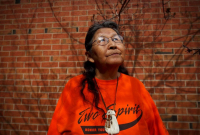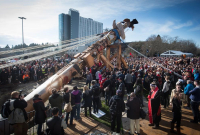Support strong Canadian climate journalism for 2025
The chief commissioner of the national inquiry into missing and murdered indigenous women says there is still hope in the work the commission is doing, despite criticism about delays.
Marion Buller said Friday some people want the commission to proceed faster and she understands the frustration of those who have been waiting up to 40 years for answers.
"I understand their anxiety," she told a news conference at the First Nations House of Learning on the campus of the University of British Columbia.
But she said there are others who are telling the commission to be careful and respectful so that it doesn't cause any more damage or retraumatize people.
"I understand where they are coming from too, because they don't want the hurt to continue."
Buller said a lot of work has been done behind the scenes and she still expects to release the commission's first report in November.
Earlier this week, Indigenous Affairs Minister Carolyn Bennett said she shares the concerns of family members who are growing more anxious about the inquiry.
Bennett was responding to questions about an open letter released Monday by more than 30 advocates, indigenous leaders and family members expressing their misgivings to Buller.
The group, which published its comments on the website of Metis artist Christi Belcourt, said it is aware the commission faces a difficult challenge, but it noted immediate action must be taken to shift the current approach and prevent damage.
Buller said the inquiry is speaking to families of those who have lost loved ones.
"There is still a lot of hope out there," she said. "We still enjoy the support of many family members across Canada, many survivors across Canada. We continue to receive letters, emails, telephone calls of people saying we support what you are doing. We receive some great comments of what we can do better."
Buller said the commission could have started a courtroom-like inquiry months ago because that has been done many times before, but this inquiry is different.
"We want to take a decolonized, indigenous approach to this work that will do no further harm. You can't roll that out in a couple of months. It takes time to do it right and we intend to do it right. That's the only way that's fair, to honour the spirits of the lost women and girls, and to honour the spirits of the survivors."
The inquiry is being conducted by Buller, the first female First Nations judge in B.C., and four other commissioners. It is expected to take two years and cost $53.8 million.
The commission is set to hold its first public hearing May 29 in Whitehorse in a tent instead of a courtroom.
Other community meetings won't take place until later in the fall at the earliest.





Comments